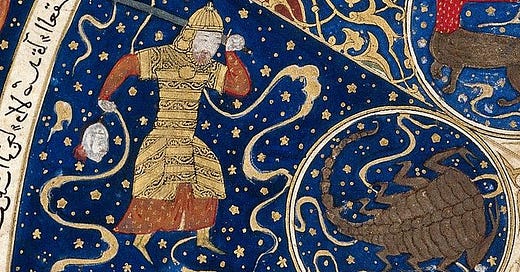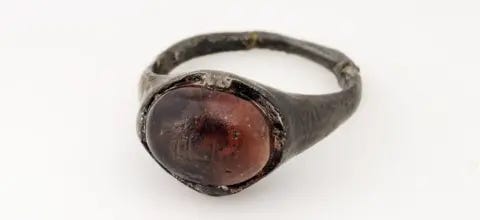Islam, the Vikings, and Imam Ali 💫
the ancient interactions between Muslims and Vikings and why humans have always been connected
✩₊˚.⋆☾⋆⁺₊✧✩₊˚.⋆☾⋆⁺₊✧✩₊˚.⋆☾⋆⁺₊✧✩₊˚.⋆☾⋆⁺₊✧✩₊˚.⋆☾⋆⁺₊✧✩₊˚.⋆☾⋆⁺₊✧✩₊˚.⋆☾⋆⁺₊✧✩₊˚.⋆☾
When we think of the Vikings, we often think of bloodshed, raids, and axes. Lots of axes. We think of them as stealing hordes of gold and pillaging Christian Europe. We think of Norse mythology with Thor, Asgard, and the halls of Valhalla. But have you ever thought of Vikings peacefully interacting with Muslims and wearing Islamic merch? No, seriously— this is the surprise researchers in Sweden felt when they found Islamic references on the burial clothing of Vikings.
Initially kept in storage for more than 100 years and assumed to be normal examples of Viking Age funeral attire, the more rapid discovery of contact between Vikings and Muslims during the Middle Ages demands new investigations. These fragments caught the attention of textile archaeologist Annika Larsson of Uppsala University who became interested in these fragments after discovering that the material had come from Persia and China. Larsson claimed that she could not make sense of the geometric designs as she had not seen them before in Scandinavia, but, as she puts it: “then I remembered where I had seen similar designs —in Spain, on Moorish textiles.”
After some research, Larsson realized that these were not Viking patterns, but rather the Arabic Kufic script (a script developed in the Iraqi town of Kufah in the 7th Century; one of the first scripts used to transcribe the Quran). With the help of an Iranian colleague, she identified two reoccurring words: “Ali”, the successor of the Prophet Muhammad (PBUH) in the Shia tradition and “Allah”, or ‘God’ in Arabic.
There is some speculation that the wearers of these garments were Muslims from the Middle East that were buried in Scandinavia, but it is more likely that they were Scandinavians. Larsson elaborates on this: “We know from other Viking tomb excavations that DNA analysis has shown some of the people buried in them originated from places like Persia, where Islam was very dominant. However, it is more likely these findings show that Viking age burial customs were influenced by Islamic ideas such as eternal life in paradise after death.”
Although there is still debate over the interpretation of the clothing, after this discovery, Larsson claims that she is convinced she will find more evidence of the integration of Islamic culture into Viking society.
But this isn’t the only Islamic object found amongst the Vikings. A ring found inside a 9th-century woman’s grave in Birka, Sweden was reanalyzed in 2015 to find a Kufic inscription saying “for Allah”. Islamic craftsmanship influenced Viking ornamentation and metallurgy. Islamic coins have been found across many countries in the Northern Hemisphere, too. So what can this tell us about Viking and Muslim relations in the Middle Ages?
During the Middle Ages, Vikings, especially the Varangians (primarily from Sweden) and Rus’ (a subgroup of the Varangians who settled in Eastern Europe), traveled along the Volga and Dnieper Rivers, which led to trade routes that connected them with Islamic empires such as the Abbasid Caliphate. It is clear that there was a strong economic relationship between the two as numerous Islamic silver dirhams (unit of currency used across the Muslim world) have been found in Scandinavia. Although, what I find most interesting are Muslim accounts of the Vikings. And there are a lot of them (Muhammad al-Idrisi (1100–1165), Ibn Khordadbeh (820–910), Al-Tartushi (1059–1127), Al-Mas’udi (896–956), Al-Muqaddasi (940–991), Ibn Rustah, Miskawayh (932–1030), Ibn Hawqal, Ahmad al-Ya’qubi (897–898), Ibn Qutiya, Yaqut al-Rumi (1179–1229), Yahya Ibn Hakam al-Bakri (772–866), Al-Maqqari (1578–1632), Ibn al-Athir (1160–1233), etc.), suggesting a mutual curiosity and respect for one another.
Often referred to as Saqalibah (a general term used for the peoples of Northern and Eastern Europe), much of what we know about the Vikings come from the accounts of Muslim travelers. The most famous and vivid account comes from Ahmed Ibn Fadlan, a 10th-century traveler and diplomat of the Abbasid Caliphate, who met the Rus’ along the Volga River. While he criticized their hygiene (especially disgusted by the fact that they did not clean themselves after eating, going to the bathroom, or engaging in intercourse), he also expressed admiration by describing them as “perfect physical specimens” that were “tall as date palms”.
The 10th-century Persian geographer Ibn Rustah offered another particularly flattering view of the Vikings:
“They keep their clothes clean and the men adorn themselves with armbands of gold… They are generous to each other, honor their guests and treat well those who seek refuge with them, and all who come to visit them. They do not allow anyone to annoy or harm these. And whenever anyone dares to treat them unfairly, they help and defend them.”
Unlike many European Christian accounts, which often portray the Vikings as savage, barbaric, and backwards, Muslim scholars offered a more humanistic insight into the nature of Viking culture and society.
While Vikings were polytheistic and later converted to Christianity, there is evidence that suggests a smaller number of Vikings converted to Islam, particularly in the Iberian Peninsula. For example, a community of settled Vikings in southeast Seville, converted to Islam and would later be famous for supplying cheese to other Spanish towns. Although this is beyond the time period of the Middle Ages, I wanted to mention what Amin Razi, a 16th-century Muslim geographer who recorded cultural habits of Vikings, said:
“They [the Vikings] highly valued pork. Even those who had converted to Islam aspired to it and were very fond of pork.”
I get it. As a Muslim myself, pork seems irresistible.
Aftermath ⋆✴︎˚。⋆⋆✴︎˚。⋆⋆✴︎˚。⋆
In August 2024, far-right extremists held a protest in Stockholm demanding the deportation of Muslims and a ban on Islam as a whole in Sweden. Many Scandinavian countries, such as Denmark and Norway, have since attempted to ban Islamic attire in schools, universities, and nurseries. In 2022, far-right activist Rasmus Paludan was publicly protected for burning a Quran and making offensive remarks about Muslims in Malmö, Sweden. Stram Kurs (Danish far-right, nationalist political party) under Paludan’s leadership, has advocated for banning Islam and deporting Muslims from Denmark. After getting it’s required 20,000 signatures to appear on the ballot, the party gained 1.8% of the vote in the 2019 Danish general election but did not secure any seats in parliament.
I find it hilarious that Islamophobes and Muslim extremists have the same view of Islam while the rest of the 1.86 billion (93%) Muslims of the world continue to practice Islam in it’s peaceful reality. In fact (according to information from the Gallup World Poll in the book Who Speaks for Islam?: What a Billion Muslims Really Think), only 7% of Muslims worldwide have views that could be considered “politically radical”.
Despite the friendship and respect that the ancestors of Scandinavians and Muslims had for each other, it seems that some have never learned the kindness that humanity has at it’s core. We consider our ancestors to be backwards and stupid, but if we look closer, they had more peace and love for one another than we do now in our modern, “advanced” world. People have always been people— complex, empathetic, easily hurt and slow to heal— but every person has been given a life on this planet to embrace existence, thus every person is worthy of love. Why take away that human right to be loved and respected?
Thank you for reading my little ramble of the week ❤️
Keep telling and collecting stories,
Ava ⚔️✨
Sources:
“Why Did Vikings Have “Allah” Embroidered into Funeral Clothes?” BBC News, 12 Oct. 2017, www.bbc.com/news/world-europe-41567391.
AhmedSalim. “5 Things You Didn’t Know about Vikings and Muslim Civilisation.” 1001 Inventions, 1 Oct. 2017, www.1001inventions.com/vikings/.
“August 27, 2024 - Bridge Initiative.” Bridge Initiative, 2024, bridge.georgetown.edu/today_islamophobia/august-27-2024/? Accessed 10 June 2025.
Esposito, J. L., & Mogahed, D. (2007). Who Speaks for Islam? What a Billion Muslims Really Think. Gallup Press.
ISBN: 9781595620170“Denmark: Parliament Election Results 2019.” Statista, www.statista.com/statistics/1013598/parliament-election-results-in-denmark/.
“Danish Far-Right Party Calling for Muslim Deportation to Stand in Election.” The Guardian, 5 May 2019, www.theguardian.com/world/2019/may/05/danish-far-right-party-stram-kurs-calling-for-muslim-deportation-to-stand-in-election.







really fascinating
Wonderful topic, thank you very much ! 🙏🏻✨